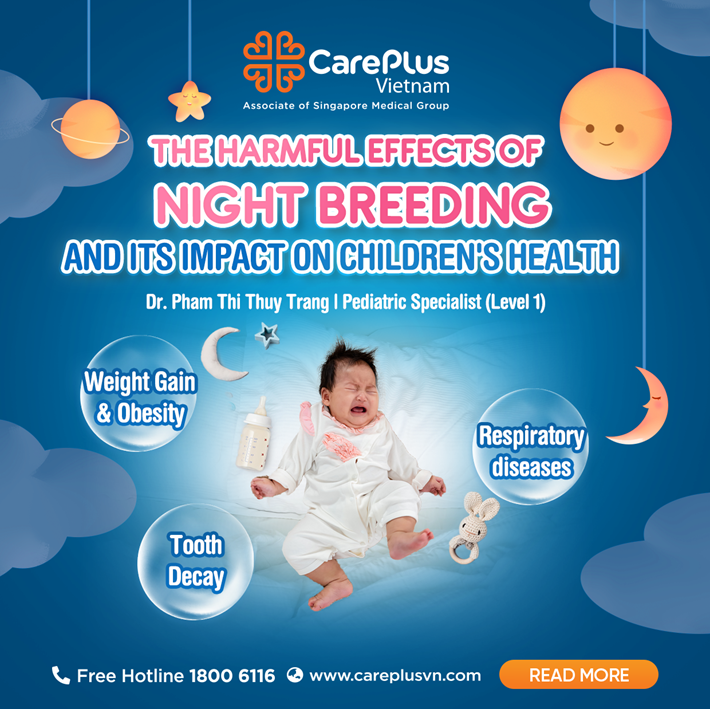THE IMPACT OF NIGHTTIME FEEDING ON CHILDREN'S HEALTH

6/4/2025 11:22:04 AM
THE IMPACT OF NIGHTTIME FEEDING ON CHILDREN'S HEALTH
👩🏻⚕️ Let’s explore this topic with Dr. Pham Thi Thuy Trang, Pediatric Specialist Level I and Head of the Pediatrics Department.
🍼 Nighttime feeding is a common caregiving practice, especially during the first year of life. However, recent studies suggest that prolonged nighttime feeding—particularly bottle-feeding right before or during sleep—can negatively affect a child’s weight, respiratory system, and long-term development.
1️⃣ Impact on Weight and Risk of Overweight
Uncontrolled nighttime feeding may lead to early overweight or obesity. On the other hand, reducing night feeds and implementing balanced nutrition during the day support healthier growth patterns.
2️⃣ Bottle-feeding Until Age 3 Doubles the Risk of Tooth Decay
Research shows that children who continue bottle-feeding until the age of three are twice as likely to develop dental caries compared to those who are weaned earlier. Milk that remains in the mouth overnight provides an ideal environment for bacteria to grow, leading to enamel erosion and tooth decay.
3️⃣ Effects on the Respiratory System
A Korean study on children with prolonged respiratory symptoms (>8 weeks) found that:
▪️ Children who stopped nighttime bottle-feeding showed significant improvement in symptoms such as coughing, wheezing, runny nose, and nasal congestion within 3 months.
▪️ The likely cause is gastroesophageal reflux (GER) and microaspiration while lying down during sleep—especially in young children with underdeveloped respiratory and autonomic systems—which can irritate the airways and worsen chronic inflammation.
▪️ Prolonged nighttime bottle-feeding is not only linked to chronic respiratory symptoms but also increases the risk of early-onset asthma and wheezing by 1.5 times.
4️⃣ Clinical Recommendations on Nighttime Feeding
- Under 6 months: Feed on demand, especially if the baby is hungry.
- 6 to 12 months: Begin to gradually reduce nighttime feeds and shift caloric intake to daytime.
- Over 12 months: Night feeds should be stopped entirely to complete the weaning process.
🔎 Tips for Parents:
▪️ Avoid bottle-feeding while the child is lying down to sleep.
▪️ Don’t automatically offer milk every time the child wakes at night.
▪️ After 6 months, consider offering water instead of milk at night to soothe the child.
▪️ Gradually reduce night feeds while increasing daytime nutrition.
Therefore, prolonged nighttime feeding—especially bottle-feeding while lying down after 6 months of age—can negatively affect a child’s health in the following ways:
▪️ Increased risk of overweight, obesity, and tooth decay.
▪️ Higher incidence of chronic respiratory symptoms, including wheezing and coughing.
▪️ Disruption of sleep development and immature nervous system regulation.
👩🏻⚕️ According to Dr. Pham Thi Thuy Trang:
"Reducing nighttime feeds in a structured and informed way, combined with proper caregiver education and nutritional adjustments, is a scientifically supported approach to promoting optimal growth and disease prevention in children."
🏥 At CarePlus International Clinic, we offer Breastfeeding and Infant Care Counseling Services to help parents understand nutritional needs at each stage and safely transition away from nighttime feeds.
👉 Prolonged nighttime feeding can disrupt sleep and significantly increase the risk of tooth decay, excess weight, and chronic respiratory problems in children. Don’t overlook what may seem like harmless habits—listen to your child’s body and contact CarePlus if you notice any concerning signs.
📞 Message us on our Fanpage or call 1800 6116 (toll-free) for personalized consultation and to book an appointment quickly!
References
. Luisa Low (2025). Bottle feeding toddlers to sleep linked to dental decay and excess weight.
. Thomas DM, et al. (2022). The impact of reducing the frequency of night feeding on infant BMI. Pediatric Research. PMC8604149
. Kim HY, et al. (2011). Prolonged bedtime bottle feeding and respiratory symptoms in infants. Asia Pac Allergy, 1(1), 30–35. doi:10.5415/apallergy.2011.1.1.30